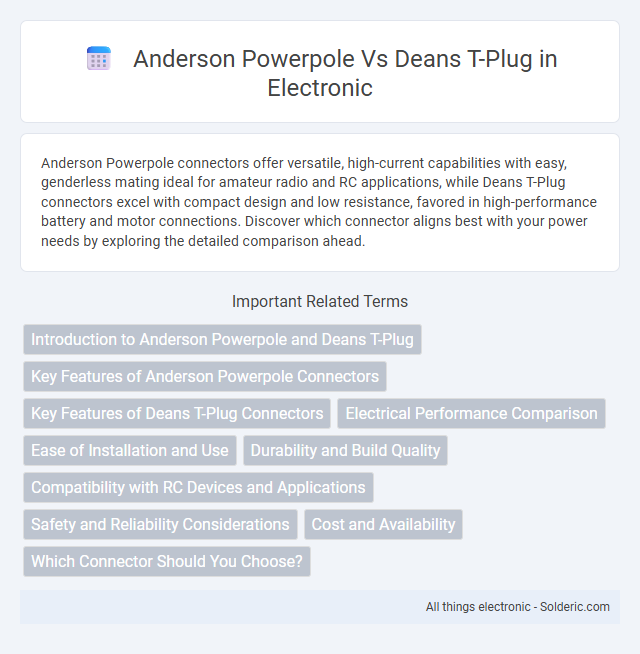Anderson Powerpole connectors offer versatile, high-current capabilities with easy, genderless mating ideal for amateur radio and RC applications, while Deans T-Plug connectors excel with compact design and low resistance, favored in high-performance battery and motor connections. Discover which connector aligns best with your power needs by exploring the detailed comparison ahead.
Comparison Table
| Feature | Anderson Powerpole | Deans T-Plug |
|---|---|---|
| Connector Type | Genderless, stackable contacts | Polarized, two-pin plug |
| Current Rating | Up to 45A continuous | Up to 60A continuous |
| Voltage Rating | 600V DC | Up to 60V DC |
| Contact Material | Gold-plated copper | Gold-plated brass |
| Durability | High, rated for 1000+ insertions | Medium, around 100+ insertions |
| Usage | Amateur radio, RC, industrial | Radio control (RC) hobbies |
| Polarity Protection | Stackable with keyed housings | Polarized connector prevents reverse |
| Ease of Assembly | Requires crimp tools | Solder or crimp required |
| Size | Compact, modular design | Smaller, low profile |
| Price | Moderate | Low to Moderate |
Introduction to Anderson Powerpole and Deans T-Plug
Anderson Powerpole connectors provide a modular, genderless design popular in amateur radio and robotics for reliable high-current connections. Deans T-Plug connectors, known for their compact size and low resistance, are favored in RC vehicles and electric models for efficient power delivery. Both connectors excel in durability and conductivity but serve different electronic power distribution needs based on application requirements.
Key Features of Anderson Powerpole Connectors
Anderson Powerpole connectors feature a modular, genderless design that ensures easy and reliable connections with a current rating of up to 45 amps, making them ideal for high-power applications. Their robust construction includes silver-plated copper contacts and durable, impact-resistant housings that provide excellent conductivity and long-lasting performance. The connectors also support stackable configurations and color-coded housings, enhancing versatility and simplifying identification in complex wiring setups.
Key Features of Deans T-Plug Connectors
Deans T-Plug connectors are renowned for their low resistance and high current capacity, making them ideal for high-performance RC applications. Their compact design ensures a secure, tight connection while minimizing voltage drop, supporting up to 60 amps of continuous current. You benefit from reliable, vibration-resistant performance, essential for maintaining consistent power in demanding environments.
Electrical Performance Comparison
Anderson Powerpole connectors offer superior current handling capabilities up to 45 amps continuously with low contact resistance, making them ideal for high-performance electrical setups. Deans T-Plug connectors typically handle around 40 amps but may exhibit slightly higher resistance due to their smaller contact area, affecting voltage drop under heavy loads. When assessing electrical performance, your choice between Anderson Powerpole and Deans T-Plug should consider continuous current rating and contact reliability for optimal efficiency.
Ease of Installation and Use
Anderson Powerpole connectors offer a modular design with genderless housings, allowing for quick and straightforward installation without worrying about polarity mistakes, making them user-friendly for both beginners and professionals. Deans T-Plug connectors require precise soldering and correct orientation due to their polarized design, which can complicate the installation process for less experienced users. The Powerpole's snap-together mechanism provides a reliable and reusable connection, enhancing ease of use compared to the more permanent and delicate solder connections of Deans T-Plugs.
Durability and Build Quality
Anderson Powerpole connectors are renowned for their robust construction, featuring durable, high-quality materials that ensure reliable performance under heavy use and harsh conditions. Deans T-Plugs, while compact and popular in RC applications, typically have a lower tolerance for mechanical stress and can be prone to damage with frequent handling. You can expect enhanced longevity and consistent electrical contact with Anderson Powerpoles, making them ideal for demanding power distribution setups.
Compatibility with RC Devices and Applications
Anderson Powerpole connectors offer versatile compatibility with a wide range of RC devices due to their modular design and ability to handle higher current loads, making them ideal for applications requiring robust power delivery. Deans T-Plug connectors, favored for their compact size and low resistance, provide excellent performance in high-current RC battery connections but may require adapters for broader device compatibility. Choosing the right connector depends on your RC device's current requirements and whether seamless integration or maximum efficiency is your priority.
Safety and Reliability Considerations
Anderson Powerpole connectors are renowned for their robust contact design and secure locking mechanism, which significantly reduce the risk of accidental disconnection and electrical arcing, enhancing overall safety and reliability. Deans T-Plug connectors offer a low-resistance contact area but may be more susceptible to connection wear and inadvertent unplugging under vibration or stress, potentially compromising reliability in demanding applications. Choosing Anderson Powerpole connectors is often preferred in environments requiring higher durability and consistent electrical performance, making them a safer and more reliable option for critical power connections.
Cost and Availability
Anderson Powerpole connectors are generally more cost-effective and widely available through various electronics retailers and online stores, making them a popular choice for amateur radio and RC enthusiasts. Deans T-Plug connectors tend to be more expensive and less commonly stocked, often requiring specialized hobby shops or online specialty stores for purchase. The broader availability of Anderson Powerpoles translates to easier sourcing and replacement, while Deans plugs may incur higher shipping costs due to limited distribution channels.
Which Connector Should You Choose?
Anderson Powerpole connectors offer high current capacity, ease of connection, and modular design, making them ideal for amateur radio and power distribution applications. Deans T-Plug connectors excel in high-current, low-resistance performance, making them popular for RC vehicles and battery packs where a secure, compact connection is critical. Choose Anderson Powerpole for versatility and durable multi-wire setups, while Deans T-Plug suits high-current, space-sensitive uses requiring minimal voltage drop.
Anderson Powerpole vs Deans T-Plug Infographic

 solderic.com
solderic.com